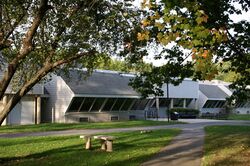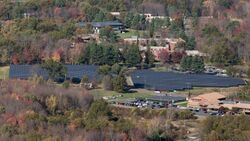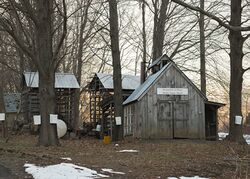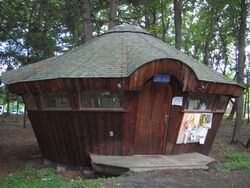Hampshire College
Topic: Organization
 From HandWiki - Reading time: 23 min
From HandWiki - Reading time: 23 min
 | |
| Motto | "Non satis scire" |
|---|---|
Motto in English | "To Know Is Not Enough" |
| Type | private liberal arts college |
| Established | 1965 |
| Endowment | $54.5 million (2022)[1] |
| Budget | $35.7 million[1] |
| President | Edward Wingenbach |
Academic staff | 145 (Fall 2018)[2] |
Administrative staff | 115 |
| Undergraduates | 508 (2022–2023)[1] |
| Location | Amherst , , United States [ ⚑ ] : 42°19′30″N 72°31′51″W / 42.3249°N 72.5308°W |
| Campus | Rural, 800 acres (3.2 km2) |
| |u}}rs | Teal, black, forest green, gold |
| Affiliations | Five College Consortium CLAC Project Pericles NAICU AICUM |
| Website | hampshire |
Hampshire College is a private liberal arts college in Amherst, Massachusetts. It was opened in 1970 as an experiment in alternative education, in association with four other colleges in the Pioneer Valley: Amherst College, Smith College, Mount Holyoke College, and the University of Massachusetts Amherst. Together they are known as the Five College Consortium. The campus also houses the National Yiddish Book Center and Eric Carle Museum, and hosts the annual Hampshire College Summer Studies in Mathematics.
The college utilizes an alternative curriculum, with an emphasis on progressive pedagogy and self-directed academic concentrations, a focus on portfolios rather than distribution requirements, and a reliance on narrative evaluations instead of grades and GPAs.
In January 2019, following the announcement that the college would seek a merger with another institution, the college received backlash from students and faculty and announced a re-envisioning project to ensure the college remain independent and sustainable.[3][4] As a result of the controversy, President Miriam Nelson stepped down; Hampshire hired its tenth president, Edward Wingenbach, beginning an effort to revise the curriculum in order to increase interdisciplinarity, collaboration, and access.[5][6][7]
History


The idea for Hampshire College originated in 1958 when the presidents of Amherst, Mount Holyoke, Smith Colleges, and the University of Massachusetts Amherst appointed a committee to examine the assumptions and practices of liberal arts education. Their report, "The New College Plan",[8] advocated many of the features that have since been realized in the Hampshire curriculum: inviting students to self-design their program of studies; training students to be able to educate themselves through their lifetimes; emphasis on each student's curiosity and motivation; learning among and across multiple disciplines; and close mentoring relationships with teachers.[9]
In 1965, Amherst College alumnus Harold F. Johnson, inspired by the New College Plan, donated $6 million toward the founding of Hampshire College. With a matching grant from the Ford Foundation, Hampshire's first trustees purchased 800 acres (3.2 km2) of orchard and farmland in South Amherst, Massachusetts, and construction began.
One of the most important founding documents of Hampshire College is the book The Making of a College (MIT Press, 1967; ISBN 0-262-66005-9), co-written by the College's first president, Franklin Patterson, together with Hampshire's founding employee from Amherst College who would become its second president, Chuck Longsworth. The Making of a College is (as of 2003) out of print but available in electronic form from the Hampshire College Archives.[10]
Hampshire admitted its first students in 1970.[11] For several years immediately after its founding in the early 1970s, the large number of applications for matriculation caused Hampshire College to be among the most selective undergraduate programs in the United States.[12] Its admissions selectivity declined after that because of declining application popularity. The school's number of applications increased again in the late 1990s, causing increased admissions selectivity.
The school has been financially challenged throughout its history, largely because it lacked a founding endowment to rely on for income stability. It has relied substantially on tuition income for operations. As of June 30, 2017, the endowment had risen to $48.5 million.[13] In recent years, the school has been on more solid financial footing, though still lacking a sizable endowment. In recent years its financial stability has relied on fundraising efforts led by its seventh president, Jonathan Lash.
In the mid-1990s, the college began establishing a "cultural village" making possible the residence of independent non-profit organizations on its campus. The cultural village[14] includes the National Yiddish Book Center, the Eric Carle Museum of Picture Book Art and The Hitchcock Center for the Environment.

Adele Simmons served as the College's third president from 1977 to 1989. Gregory Prince served as its fourth president from 1989 to 2005, the longest tenure of any Hampshire president.
On April 1, 2004, Prince announced his retirement, effective at the end of the 2004–2005 academic year. On April 5, 2005, the Board of Trustees named Ralph Hexter, formerly a dean at University of California, Berkeley's College of Letters and Science, as the college's next president, effective August 1, 2005. Hexter was inaugurated on October 15, 2005. The appointment made Hampshire one of a small number of colleges and universities in the United States with an openly gay president.[15][16][17]
Professor Marlene Gerber Fried was interim president from 2010 to 2011. Jonathan Lash was named the sixth president of the College in May 2011, joining Hampshire as an internationally recognized expert on global sustainability, climate change, and environmental challenges and solutions. Two US Presidents have appointed him to serve on a national environmental council and commission. Lash served until 2018 and was followed by the college's seventh president, Miriam Nelson, who began her appointment in July 2018 but resigned in April 2019 after the failure of her plan for Hampshire to merge or partner with another institution.[18][19]
The Hampshire College Archives in the Harold F. Johnson Library has extensively documented the college's history between 1965 and 2005, accessible on the college's Web site.[20]
On August 23, 2012, the school announced the establishment of a scholarship fund dedicated to helping undocumented students get degrees. It would give more than $25,000 yearly to help an undocumented student pay for the $43,000-plus tuition.[21]
2019 strategic partnership and financial challenges
On January 15, 2019, president Miriam Nelson and the Board of Trustees announced that the college was planning to seek a strategic partner to ensure long-term sustainability due to financial instability and small endowment.[22] In addition, the college was considering not accepting a new first-year class for Fall 2019, due to concerns with compliance and accreditation.[22] On February 1, the board of trustees voted that, for the Fall 2019 semester, it would only be admitting about 60 students who had already been offered early admission or who had previously deferred admission until Fall 2019.[23] Furthermore, early admission students were released from their pledge to attend Hampshire College.
Some alumni protested these decisions, as did many students, who organized sit-ins in the Dean of Students office and the Office of the President, demanding more transparency from the administration and board of trustees and for student, staff, and faculty voices to be taken into account in decision-making processes.[6][24][25] The occupation in the Dean of Students office ended after a few weeks, and the sit-in in the president's office lasted for 75 days, ending on April 22, 2019.[26]
Following an announcement of the possibility that 30%–50% of the faculty and staff might be laid off, the faculty held a vote of no confidence in President Nelson, the board chair, the board vice chair, the incoming board chair, the board treasurer, and the vice president for finance and administration.[27] Because a binding motion is required to be public for seven days before it is acted on, the February 20 no-confidence vote was not binding.[27] A week later, the majority of the faculty decided not to move forward with a binding vote of no confidence.[28]
On March 31, the chair of the board of trustees resigned. On April 5, Miriam Nelson, the Board's Vice Chair, and six other trustees resigned. Nelson said that her continued presence would be a "distraction" from the necessary work of improving the college's financial future.[29] Shortly afterwards, the board announced the decision to prioritize remaining independent through a capital campaign led by alumnus Ken Burns.[19] Ken Rosenthal was named interim president.[29] The first round of layoffs primarily affected the admissions and fundraising offices, effective April 19, 2019.[30] Ed Wingenbach became the new president in August.[31]
Gradually, more information was released on what had happened. In February, following a public records request, the University of Massachusetts Amherst released emails between its chancellor and Hampshire's president discussing a partnership between the two schools, later confirmed by UMass' president.[32][33] By August, emails were released stating that, UMass was considering the idea but only if Hampshire would be closed entirely and there were massive layoffs of its faculty.[34] Hampshire wanted its name and its "spirit of interdisciplinary and independent studies" to continue, its students would be able to continue their studies at UMass, and that Hampshire's staff and faculty would be considered for positions at UMass.[34] Ultimately, UMass and Hampshire could not come to an agreement.[34]
In September 2019, the first-year class was 13 students. Total enrollment was around 750 students, substantially less than typical, due to decreased retention rates.[35]
How Hampshire is rebuilding
The fundraising campaign, Change in the Making: A Campaign for Hampshire was launched in late 2019 with the goal of raising $60 million in unrestricted operating support by 2024. By March 2023, nearly $40 million had been raised.[36] Alumnus documentarian Ken Burns committed to serve as cochair.[37] In November 2020, Hampshire received its largest single donation since its founding, $5 million, by alumnus James S. Crown and his wife, Paula H. Crown.[38] Later that month, alumnus Dr. Lucy McFadden contributed $2 million.[39] In January 2022, The College received an anonymous gift of $5 million to fund the Ken Burns Initiative to Transform Higher Education.[40] In January 2023, Stonyfield Yogurt cofounder and Hampshire alumnus Gary Hirshberg invested $1 million in the campaign.
In 2021, the College rebuilt its admissions operations, resulting in a 68 percent increase in enrollment over fall 2020 and a 100 percent increase in first-year enrollments over 2020. In fall of 2022, Hampshire welcomed its largest entering class since 2018, with 275 new students.[41]
In 2020, continuing its legacy of innovation, Hampshire did away with departmental structures, reorganizing around urgent, global challenges like climate change, white supremacy, and life in a "post-truth" era.[42]
Delayed a year due to the Covid-19 pandemic, Hampshire celebrated its 50th anniversary over the weekend of October 15–17, 2021, welcoming back to campus almost 900 guests, among them alums, families, community friends, donors, and former presidents and faculty members. Current staff, faculty, and students also participated in the festivities.[43]
On March 9, 2023, "in response to the continuing attacks on New College of Florida intended to limit intellectual exploration, turn back progress toward inclusion, and curtail open discussion of race, injustice, and histories of oppression," Hampshire College extended an invitation of admission to its students, matching their current cost of tuition.[44]
Presidents
- Franklin Patterson (1966–1971)
- Charles R. Longsworth (1971–1977)
- Adele S. Simmons (1977–1989)
- Gregory S. Prince, Jr. (1989–2005)
- Ralph J. Hexter (2005–2010)
- Marlene Gerber Fried (2010–2011) (interim)
- Jonathan Lash (2011–2018)
- Miriam E. Nelson (2018–2019)
- Kenneth Rosenthal (2019) (interim)
- Edward Wingenbach (2019–present)[45][46]
Athletics
Hampshire athletic teams are the Black Sheep. The college is a member of the United States Collegiate Athletic Association (USCAA), primarily competing in the Yankee Small College Conference (YSCC) since the 2011–12 academic year.
Hampshire competes in eight intercollegiate varsity sports, including basketball, cross country, soccer, and track & field.
Academics and resources
Curriculum
Hampshire College is accredited by the New England Commission of Higher Education.[47] Hampshire College describes itself as "experimenting" rather than "experimental", to emphasize the changing nature of its curriculum. From its inception, the curriculum has generally had certain non-traditional features:
- An emphasis on project work as well as, or instead of, courses
- Detailed written evaluations (as well as portfolio evaluations) for completed courses and projects, rather than letter or number grades
- A curriculum centered on student interests, with students taking an active role in designing their own concentrations and projects
- An emphasis on independent motivation and student organization, both within and without the college's formal curriculum

The curriculum is divided into three "divisions" rather than four grade-years:[48]
- Division I: Exploration and Working Across Disciplines[49]
- Division II: Concentration[50]
- Division III: Creating Knowledge[51]
Its most popular majors, by 2021 graduates, were:[52]
- Creative Writing (33)
- Art/Art Studies (20)
- Film/Video & Photographic Arts (14)
- Sociology (10)
Schools and programs

The Hampshire College faculty are organized broadly in defined Schools of thought:
- Cognitive Science (CS): includes linguistics, most psychology, some philosophy, neuroscience, and computer science.
- Humanities, Arts, and Cultural Studies (HACU): includes film, some studio arts, literature, media studies, architecture, art history, dance, music, and most philosophy.
- Critical Social Inquiry (CSI): includes most sociology and anthropology, economics, history, politics, and some psychology.
- Natural Science (NS): includes most traditional sciences, mathematics, and biological anthropology.
- Interdisciplinary Arts (IA): includes theater, some studio arts, creative writing, and social entrepreneurship.
The Five College Program in Peace and World Security Studies (PAWSS) is based at Hampshire; its director is Michael Klare.[53] The national reproductive rights organization Civil Liberties and Public Policy (CLPP) operates on Hampshire's campus, where they host an annual conference.[54] In 2014 Hampshire announced the formation of a new concentration, in Psychoanalytic Studies.[55]
Five College Consortium
Hampshire College is the youngest of the schools in the Five-College Consortium. The other schools are Amherst College, Mt. Holyoke College, Smith College and the University of Massachusetts Amherst.[56]
Students at each of the schools may take classes and borrow books at the other schools, generally without paying additional fees. They may use resources at the other schools, including internet access, dining halls, and so forth. The five colleges collectively offer over 5,300 courses, and the five libraries have over eight million books.[57] The Pioneer Valley Transit Authority (PVTA) operates bus services between the schools and the greater Pioneer Valley area.[58]
There are two joint departments in the five-college consortium: Dance and Astronomy.[59]
Admissions
Hampshire College stopped accepting SAT and ACT scores of applicants in 2014 both to eliminate income and ethnicity biases in standardized testing and focus assessment on data better correlated with college success and on a longer period of time rather than a single high-pressure test. As a result, it was dropped from the U.S. News & World Report Best Colleges Ranking. The next year, the college said this move decreased the quantity but increased the quality and diversity of applicants, eliminated the incentive to "game" the U.S. News & World Report ranking by admitting less-qualified students with higher numerical scores or encouraging unqualified students to apply.[60]
Sustainability
The R.W. Kern Center
Opened on April 26, 2017, the R.W. Kern Center is the 17th Living Building in the world certified under the advanced green-building standard, the Living Building Challenge. The building cost $10.4 million made possible by private donations. It operates net-zero energy, water, and waste. The building is powered by solar panels on its roof, supplies its own drinking water by harvesting rainwater from its roof, manages its wastewater on site, and contains composting toilets. The Kern Center was built using materials from local sources without the use of any toxic "red list" materials; even materials such as duct tape were chosen carefully to comply with strict environmental standards.[61] Currently, the Kern Center houses Admissions and financial aid offices as well as classrooms, student lounges, and a coffee shop. President Jonathan Lash stated that "[w]ith this building we have sought to reflect our values, in the inclusive design process, the design and materials, our construction practices, and our reporting about the building... [w]hy are buildings constructed any other way? In every way, the Kern Center was built to learn and teach."[62][63]
Climate Action Plan
In the next 20 years, the college plans to reduce 50% of current consumption of energy, another major goal stated in their Climate Action Plan. They plan to renovate the Robert Crown Center, Library, Cole Science Center, Franklin Patterson Hall, Merrill House, and Greenwich House. The plan is made possible by a $1 million gift.[64]
Solar power

Hampshire College planned to become the first college in the United States to be 100% solar powered. The solar panel array is a part of the college's main goal - to be climate-neutral by 2020 according to their extensive Climate Action Plan developed in April 2012. The school purchases solar credits and sells solar energy from its field.[65] They began construction in February 2015. Two witness tests were conducted in June 2017 and its final one conducted November 2017. Since June 2017, part of the solar array has been powering the college. The solar panels cover 19 acres consisting of 15,000 panels which will eventually produce 4.7 megawatts of power. Hampshire College contracted with SolarCity to install the panels.[66]
The college announced it will save up to $8 million in electricity cost in 20 years and $400,000 yearly. The 4.7 megawatts of solar power avoids 3,000 metric tons of greenhouse-gas emissions per year, equivalent to 650 fewer cars on the road. Other solar sources on campus contribute to the primary solar array's power production: the Kern Center rooftop solar arrays, the CSA Barn, the president's house, and the Longworth Arts Center canopy. The president stated that "[t]his is the challenge that our students and every other student is going to face in the next 20 years, how to turn the US economy into a low-carbon economy ... and they're going to get the real firsthand experience of doing it. So that was reason number one." The president has declared that switching to renewable energy is "just the right thing to do in an era of accelerating climate change." He also noted this project will keep jobs local and avoid pipelines being built through people's communities to get power to our college."[67]
In February of 2023, The College announced that it had achieved its 2022 goal of carbon neutrality for all campus emissions, including electricity and natural gas heating.[68]
Timeline of Sustainability Initiative

Since 2011, Hampshire College has been involved in various projects to "transform its food systems, campus operations, curriculum and campus culture to embrace sustainability." The college's advances in sustainability include various projects. In 2011, the college was the first in the world to divest from fossil-fuels. In 2012, they developed the Climate Action Plan for climate neutrality by 2022.[69] Hampshire College Farm expanded their education and operation, establishing the Center for New England and Agriculture. In 2014 the main traffic circle and parking lot was eliminated and turned into a meadow. They also stopped mowing dozen acres of lawns in hopes of reducing greenhouse-gas emissions, saving landscaping expenses and creating wildlife and plant habitats. In the same year, they installed an electric car-charging station behind the library.[70] In 2015 they permanently protected 46 acres of their property through a conservation restriction. The Kern Center became their first 100% emission-free building in 2016 and the Hitchcock Center for the Environment built its new living building on Hampshire land. In 2017, Hampshire College pledged to continue to support climate action and reduce carbon emissions in accordance with the Paris Climate Agreement. They signed the We Are Still In campaign along with 2,600 total signers.[71]
Re-Radicalization
In the spring of 2004, a student group calling itself Re-Radicalization of Hampshire College (Re-Rad) emerged with a manifesto called "The Re-Making of a College", which critiqued what they saw as a betrayal of Hampshire's founding ideas in alternative education and student-centered learning. On May 3, 2004, the group staged a demonstration that packed the hall outside the President's office during an administrative meeting. Response from the community was generally amicable and Re-Rad made some progress.[72]

The Re-Radicalization movement was responding in part to a new "First-Year Plan" that changed the structure of the first year of study. Beginning in the Fall of 2002, the requirements for passing Division I were changed so that first-year students no longer had to complete independent projects (see Curriculum above). Re-Rad submitted its own counter-proposal in both 2006 and 2007, but these proposals were not acted on, and no follow-up was attempted.[citation needed]
The Re-Radicalization of Hampshire College assisted the administration in launching a pilot program known as mentored independent study. This program paired ten third semester students with Division III students with similar academic interests to complete a small study—observed by, and subject to the approval of, a faculty member.[73][better source needed]
While some students worry about what they see as Hampshire's headlong plunge into normality, the circumstances of Hampshire's founding tends to perennially attract students who revive the questions about education the institution was founded on, and who challenge the administration to honor the founding mission. Unsurprisingly, then, Re-Rad was not the first student push of its type. Similar efforts have sprung up at Hampshire with some regularity, with varying impacts. In 1996, student Chris Kawecki spearheaded a similar push called the Radical Departure, calling for a more holistic, organic integration of education into students' lives.[74] The most durable legacy of the Radical Departure was EPEC, a series of student-led non-credit courses.[75]
A more detailed account of movements such as these can be found in A Documentary History of Hampshire College, Vol. 4: 1995–2005.[72]
Campus issues
Divestment

In May 1977, Hampshire was the first college in the nation to divest from apartheid South Africa.[76] The college removed $39,000 in stocks in four companies (equivalent to $202,000 in 2024).[77] In February 2009 it was reported that Hampshire College had divested from Israel because of its violation of human rights.[78] However, under pressure from pro-Israel groups and high-profile individuals, most notably attorney Alan Dershowitz, the father of a Hampshire alumnus, Hampshire's president stated that the changes in investments were not politically motivated. Hampshire continues to display a statement from Dershowitz on its website, in which the lawyer withdraws his criticism and pledges his support, stating, "Hampshire has now done the right thing. It has made it unequivocally clear that it did not and will not divest from Israel. Indeed, it will continue to hold stock in companies that do business with Israel as well as with Israeli companies...."[79]
American flag
Following the election of Donald Trump as President of the United States, on November 9, 2016, Hampshire students lowered the American flag at the center of campus to half-staff as "a protest against acts of hate and harassment."[80] The next day, school officials announced they would allow the flag to remain at half-staff temporarily. College president Jonathan Lash said in a statement that some of the people on campus felt that the flag was "a powerful symbol of fear they've felt all their lives because they grew up in marginalized communities, never feeling safe." In an incident under investigation by campus police, the flag was burned at some time in the evening of November 10 or the morning of November 11. It was replaced the following day and the school indicated it would continue to fly the flag at half-staff "to mourn deaths from violence in the U.S. and around the world."[81] Following a backlash, the college announced on November 21 that it would temporarily cease flying the flag on campus.[82][83] This, in turn, led to protests including veterans for restoration of the flag, with sources claiming from 400 attendees to "over a thousand."[84][81] Local state representative John Velis (D) called for the school to return the flag and expel the students who burned the flag: they should "pack up their bags and leave."[85] On November 29, shortly after Fox News aired a news segment on the incident, Trump tweeted "Nobody should be allowed to burn the American flag—if they do, there must be consequences—perhaps loss of citizenship or year in jail!"[86] On December 2, the school decided to raise the flag to full staff.[87]
In the media
In November 2001, a controversial All-Community Vote at Hampshire declared the school opposed to the recently launched War on Terrorism after 9/11, another national first that drew national media attention, including scathing reports from Fox News Channel and the New York Post ("Kooky College Condemns War").
Saturday Night Live had a regular sketch, "Jarret's Room", starring Jimmy Fallon, which ostensibly takes place at Hampshire College but is instead a composite of several schools. It refers to non-existent buildings ("McGuinn Hall", which is actually the Sociology and Social Work building at fellow cast member Amy Poehler's alma mater, Boston College) and features yearbooks, tests, seniors, fraternities, three-person dorm rooms, and a football team—none of which the school has ever had. The sketch also claims that the college is actually in New Hampshire rather than Massachusetts. These characters would later be revived on The Tonight Show with Jimmy Fallon during the COVID-19 pandemic. In another SNL episode aired on December 14, 2002, host Al Gore plays Dr. Ralph Wormly Curtis, a professor at Hampshire College. The same sketch implies that the band Phish attends Hampshire as well, though in reality all four members attended the University of Vermont. In Whit Stillman's comedy-drama film The Last Days of Disco, Chloë Sevigny and Kate Beckinsale star as two recent Hampshire graduates in the early 1980s in the disco scene of New York City.
Alumnus Ken Burns wrote of the college: "Hampshire College is a perfect American place. If we look back at the history of our country, the things we celebrate were outside of the mainstream. Much of the world operated under a tyrannical model, but Americans said, 'We will govern ourselves.' So, too, Hampshire asked, at its founding, the difficult questions of how we might educate ourselves... When I entered Hampshire, I found it to be the most exciting place on earth." Loren Pope wrote of Hampshire in the college guide Colleges That Change Lives: "Today no college has students whose intellectual thyroids are more active or whose minds are more compassionately engaged."
The events around the planned closure of the college that was made unsuccessful by student protests are the subject of the 2022 film The Unmaking of a College.[88]
Alumni and faculty
Notable alumni
Hampshire College alumni have received the Pulitzer and Hillman Prizes; the National Humanities Medal; Emmy, Academy, Peabody, Tony, Golden Globe and Grammy Awards; MacArthur, Fulbright, and Guggenheim Fellowships; the National Book Award; the American Book Award; the National Book Critics Circle Award; and the National Endowment for the Arts.[citation needed]
- Notable Hampshire College alumni include:
-
Seventh Generation Inc. CEO Jeffrey Hollender
-
Stonyfield Farm CEO Gary Hirshberg
-
Economist Heather Boushey
-
9th U.S. Secretary of Veterans Affairs David Shulkin
-
Writer Jon Krakauer
-
Pulitzer Prize-winning New York Times photographer James Estrin
-
Documentarian Ken Burns
-
Director Barry Sonnenfeld
-
Academy Award-winning actress Lupita Nyong'o
-
Actor Liev Schreiber
-
Comedian Eugene Mirman
-
Composer and former Nine Inch Nails member Charlie Clouser
-
Singer-songwriter Elliott Smith
-
Composer and producer Oneohtrix Point Never
Notable past and present faculty
See also
References
- ↑ 1.0 1.1 1.2 "Hampshire at a Glance". Hampshire College. 2022. https://www.hampshire.edu/hampshire-experience/hampshire-glance.[update]
- ↑ "Common Data Set 2018–2019, Part I". Hampshire College. https://www.hampshire.edu/sites/default/files/CDS_2018-2019.pdf.
- ↑ Krantz, Laura (2019-01-15). "Hampshire College, facing financial pressure, considers merger". https://www.bostonglobe.com/metro/2019/01/15/hampshire-college-facing-financial-pressure-considers-merger/hKHgkWoZ1Ca5bs952kknCL/story.html.
- ↑ "Important Message from President Nelson". hampshire.edu. January 15, 2019. https://www.hampshire.edu/news/2019/01/15/important-message-from-president-nelson.
- ↑ "The downfall of Hampshire College and the broken business model of American higher education". The Washington Post. 2019-10-21. https://www.washingtonpost.com/magazine/2019/10/21/downfall-hampshire-college-broken-business-model-american-higher-education/.
- ↑ 6.0 6.1 Seltzer, Rick; Jaschik, Scott (February 1, 2019). "Hampshire Won't Admit More Students". https://www.insidehighered.com/news/2019/02/01/hampshire-college-wont-admit-additional-students.
- ↑ Loisel, Laurie (April 12, 2019). "Hampshire College hopes to admit freshmen next spring". The Boston Globe. https://www.bostonglobe.com/metro/2019/04/12/hampshire-college-hopes-admit-freshmen-next-spring/tydPFlinvM3vd7vOxW33TJ/story.html.
- ↑ "Data". https://www.hampshire.edu/sites/default/files/archives/files/NewColl.pdf.
- ↑ "New College Plan, 1958". https://www.hampshire.edu/library/chapter-1-precursors#11B.
- ↑ Making of a College (2004 ed.), https://sites.hampshire.edu/ctl/files/2014/07/The_Making_of_a_College.pdf, retrieved December 3, 2021
- ↑ "Acquiring Land for the New College | www.hampshire.edu". https://www.hampshire.edu/library/acquiring-land-for-the-new-college.
- ↑ Making of a College pp. 307–310.
- ↑ "Hampshire College Financial Report 2016-17". https://www.hampshire.edu/sites/default/files/businessoffice/files/031918financials1617FNL.pdf.
- ↑ "Hampshire College Welcomes Hitchcock Center to its Cultural Village". https://www.hampshire.edu/news/2016/10/01/hampshire-college-welcomes-hitchcock-center-for-the-environment-to-its-cultural.
- ↑ The exact number was unclear, but there may have been as few as eight openly gay college and university presidents as of 2007[update], and at the time Hexter was named president of Hampshire there were fewer still.
- ↑ "Openly Gay Presidents Say Chronicle Article Left Them Out". The Chronicle of Higher Education. August 7, 2007. https://www.chronicle.com/article/openly-gay-presidents-say-chronicle-article-left-them-out/.
- ↑ Hexter, Ralph J. (January 25, 2007). "Being an 'Out' President". Inside Higher Ed. https://www.insidehighered.com/views/2007/01/25/being-out-president.
- ↑ "Miriam Nelson, Prominent U.S. Health Scholar, Educator, and Policy Adviser, Named President of Hampshire". https://www.hampshire.edu/news/2018/04/17/miriam-nelson-prominent-us-health-scholar-educator-and-policy-adviser-named.
- ↑ 19.0 19.1 "Hampshire President Quits; Board Votes to Try to Stay Independent". 2019-04-08. https://www.insidehighered.com/news/2019/04/08/hampshire-college-president-quits-and-board-votes-raise-money-try-stay-independent.
- ↑ "Hampshire College Documentary Histories". https://www.hampshire.edu/library/the-documentary-histories-of-hampshire-college.
- ↑ Young, Shannon. "Mass. college offers illegal immigrant scholarship". Associated Press. http://hosted.ap.org/dynamic/stories/U/US_ILLEGAL_IMMIGRANTS_COLLEGE?SITE=AP&SECTION=HOME&TEMPLATE=DEFAULT.
- ↑ 22.0 22.1 Merzbach, Scott (January 19, 2019). "Hampshire College seeks partner". Daily Hampshire Gazette. p. A1, A8.
- ↑ Christensen, Dusty (February 2, 2019). "Trustees nix fall fall 2019 class". Daily Hampshire Gazette. p. A1, A8.
- ↑ Christensen, Dusty. "The ripple effect of Hampshire's decision to not admit a fall class". Daily Hampshire Gazette. https://www.gazettenet.com/Hampshire-College-decision-to-not-admit-full-class-felt-across-campus-23357970.
- ↑ Krakauer, Jon (January 31, 2019). " "A Small New England College Struggles to Survive." January 31, 2019. Retrieved March 15, 2019.
- ↑ Christensen, Dusty (April 26, 2019). "Hampshire College students end sit-in at president's office". Amherst Bulletin. Retrieved April 29, 2019.
- ↑ 27.0 27.1 Merzbach, Scott (February 22, 2019). "Faculty eyes vote of no confidence". Daily Hampshire Gazette. p. A1, A5.
- ↑ Christenstsen, Dusty (February 28, 2019). "College faculty table vote of no confidence". Daily Hampshire Gazette. p. B1.
- ↑ 29.0 29.1 Christiensen, Dusty (April 6, 2019). "President Nelson resigns". Daily Hampshire Gazette. p. A1, A5.
- ↑ "Hampshire College makes 1st round of layoffs". Associated Press. February 20, 2019. Retrieved March 4, 2019.
- ↑ Christensen, Dusty (August 10, 2019). "New leader bringing future into focus". Daily Hampshire Gazette. p. A1, A5.
- ↑ Merzbach, Scott; Christensen, Dusty (February 23, 2019). "Hampshire, UMass talked partnership". Daily Hampshire Gazette. p. A1, A5.
- ↑ Christensen, Dusty (April 6, 2019). "Meehan opens up about talks with Hampshire". Daily Hampshire Gazette. p. A5.
- ↑ 34.0 34.1 34.2 Christensen, Dusty (August 31, 2019). "UMass set 'draconian' conditions for merger". Daily Hampshire Gazette. p. A1, A5.
- ↑ Russell, Jim (August 30, 2019). "Hampshire College fall enrollment better than earlier forecast". Masslive. Retrieved September 17, 2019.
- ↑ "CAMPAIGN" (in en). https://frogbook.hampshire.edu/s/1669/bp20/home.aspx?sid=1669&gid=1.
- ↑ "Hampshire College Maintains Accreditation, Advances Ambitious Plan for its Future" (in en). https://www.hampshire.edu/news/hampshire-college-maintains-accreditation-advances-ambitious-plan-its-future.
- ↑ "Hampshire College Receives Largest Single Donation Since Founding" (in en). https://www.hampshire.edu/news/hampshire-college-receives-largest-single-donation-founding.
- ↑ "Alum Makes $2 Million Donation, Second Seven-Figure Contribution This Month" (in en). https://www.hampshire.edu/news/alum-makes-2-million-donation-second-seven-figure-contribution-month.
- ↑ "Hampshire College Receives Historic $5 Million Gift Honoring Alum Ken Burns" (in en). https://www.hampshire.edu/news/hampshire-college-receives-historic-5-million-gift-honoring-alum-ken-burns.
- ↑ Katcher, Will (2022-08-29). "Hampshire College sees 73% jump in incoming class — its largest since 2018" (in en). https://www.masslive.com/news/2022/08/hampshire-college-bouncing-back-from-threat-of-closure-welcomes-largest-incoming-class-since-2018.html.
- ↑ "How You Study" (in en). https://www.hampshire.edu/academics/how-you-study.
- ↑ "Hampshire College Celebrates 50th Anniversary; Marks Major Contributions to the Innovation of Higher Education" (in en). https://www.hampshire.edu/news/hampshire-college-celebrates-50th-anniversary-marks-major-contributions-innovation-higher.
- ↑ Nietzel, Michael T.. "Hampshire College Invites New College Of Florida Students To Transfer" (in en). https://www.forbes.com/sites/michaeltnietzel/2023/03/15/hampshire-college-invites-new-college-of-florida-students-to-transfer/.
- ↑ "Edward Wingenbach: President of Hampshire College". 2019. https://www.hampshire.edu/staff/edward-wingenbach.
- ↑ https://businesswest.com/blog/hampshire-college-capital-campaign-aims-to-build-a-stable-future/
- ↑ Massachusetts Institutions – NECHE, New England Commission of Higher Education, https://www.neche.org/institutions/ma/, retrieved May 26, 2021
- ↑ "Hampshire's Academic Program". https://www.hampshire.edu/academics/the-academic-program.
- ↑ "Hampshire College Division I". https://www.hampshire.edu/academics/division-i.
- ↑ "Hampshire College Division II". https://www.hampshire.edu/academics/division-ii.
- ↑ "Hampshire College Division III". https://www.hampshire.edu/academics/division-iii.
- ↑ "Hampshire College". U.S. Dept of Education. https://nces.ed.gov/collegenavigator/?q=Hampshire&s=all&id=166018#programs.
- ↑ "Peace and World Security Studies". hampshire.edu. http://pawss.hampshire.edu.
- ↑ "CLPP". http://clpp.hampshire.edu/.
- ↑ "Announcement of the new concentration". https://www.hampshire.edu/news/2014/02/21/feb-27-announcement-of-the-new-concentration-in-psychoanalytic-studies-at-hampshire.
- ↑ "Home". https://www.fivecolleges.edu/.
- ↑ "Libraries". https://www.fivecolleges.edu/libraries/.
- ↑ "Pioneer Valley Transit Authority of Western Massachusetts". pvta.com. http://www.pvta.com/.
- ↑ "Explore Academic Opportunities". https://www.fivecolleges.edu/academics/departments_programs.
- ↑ "Results of Removing Standardized Test Scores from College Admissions | www.hampshire.edu". https://www.hampshire.edu/news/2015/09/21/results-of-removing-standardized-test-scores-from-college-admissions.
- ↑ "Hampshire College Earns Living Building Certification for R.W. Kern Center". https://www.hampshire.edu/news/2018/04/10/hampshire-college-earns-living-building-certification-for-rw-kern-center.
- ↑ "Hampshire Announces Ribbon-Cutting Opening Ceremony for Kern Center". hampshirecollege.edu. https://www.hampshire.edu/news/2016/02/29/hampshire-announces-ribbon-cutting-opening-ceremony-for-kern-center.
- ↑ "At Hampshire College, sustainability efforts reach new level". bostonglobe.com. https://www.bostonglobe.com/metro/2016/02/20/hampshire-college-sustainability-efforts-reach-new-level/GZNOj27sHcdGxhWAia9fCJ/story.html.
- ↑ "Hampshire College Climate Action Plan". hampshirecollege.edu. https://www.hampshire.edu/sites/default/files/presidentsoffice/files/Climate_Action_Plan.pdf.
- ↑ https://www.hampshire.edu/news/hampshire-college-achieves-carbon-neutrality
- ↑ "Hampshire Conducts Final Test for 100% Solar Campus". hampshirecollege.edu. https://www.hampshire.edu/news/2017/12/01/hampshire-conducts-final-test-for-100-solar-campus.
- ↑ "Hampshire College goes 100% solar". msn.com. https://www.msn.com/en-us/news/world/hampshire-college-goes-100-percent-solar/ar-BBGOiJU.
- ↑ "Hampshire College Achieves Carbon Neutrality" (in en). https://www.hampshire.edu/news/hampshire-college-achieves-carbon-neutrality.
- ↑ "Climate Action Plan". https://www.hampshire.edu/sustainable/climate-action-plan.
- ↑ "Charging Station for Electric Vehicles at Hampshire College". hampshirecollege.edu. https://www.hampshire.edu/news/2014/03/26/charging-station-for-electric-vehicles-at-hampshire-college.
- ↑ "Hampshire College Supports Paris Climate Agreement as Signatory to 'We Are Still In' Campaign". hampshirecollege.edu. https://www.hampshire.edu/news/2017/06/06/hampshire-college-supports-paris-climate-agreement-as-signatory-to-we-are-still-in.
- ↑ 72.0 72.1 Dayall, Susan A., ed (2005). A Documentary History of Hampshire College. 4: 1995–2005. https://www.hampshire.edu/library/archives-and-special-collections/documentary-histories-hampshire-college/documentary-2. Retrieved 2023-05-19.
- ↑ "Re-Rad". Hampedia. March 2016. https://hampedia.org/wiki/Re-rad#History_of_the_Movemen.
- ↑ Christopher, Peter (November 17, 1996). "The Experimental Program In Education and Community". http://peterchristopher.com/peterchristopher/ed/xp/.
- ↑ "Experimental Program in Education and Community (EPEC)". hampshire.edu. https://www.hampshire.edu/cla/experimental-program-in-education-and-community-epec.
- ↑ "Volume 2, 1975–1985, Chapter 6: Divestment". Hampshire College Archives. https://www.hampshire.edu/library/chapter-6-divestment.
- ↑ "Hampshire College students win divestment from apartheid South Africa, U.S., 1977 | Global Nonviolent Action Database". http://nvdatabase.swarthmore.edu/content/hampshire-college-students-campaign-divestment-south-africa-us-1977.
- ↑ Win, Hanna Ingber (March 15, 2009). "Hampshire College Divests From Israel". https://www.huffpost.com/entry/hampshire-college-divests_n_166528.
- ↑ College, Hampshire. "Public Statement by Alan Dershowitz". https://www.hampshire.edu/news/2009/02/24/public-statement-by-alan-dershowitz.
- ↑ Hoover, Amanda (November 28, 2016). "Why Hampshire College pulled down the American Flag". The Christian Science Monitor. http://www.csmonitor.com/USA/Society/2016/1128/Why-Hampshire-College-pulled-down-the-American-Flag.
- ↑ 81.0 81.1 Bromwich, Jonah Engel (November 28, 2016). "Hampshire College Draws Protests Over Removal of U.S. Flag". The New York Times. https://www.nytimes.com/2016/11/28/us/hampshire-college-flag-veterans-protest.html.
- ↑ Svrluga, Susan (November 21, 2016). "Massachusetts college stops flying American flag after it becomes focus of dispute over Trump". The Washington Post. https://www.washingtonpost.com/news/grade-point/wp/2016/11/21/massachusetts-college-stops-flying-american-flag-after-it-becomes-focus-of-dispute-over-trump/.
- ↑ "A Statement from President Lash: "Some... - Hampshire College | Facebook". https://www.facebook.com/hampshirecollege/posts/10154927092331159.
- ↑ Afonso, Ashley (November 27, 2016). "Veterans protest flag removal at Hampshire College". http://wwlp.com/2016/11/27/veterans-protest-flag-removal-at-hampshire-college/.
- ↑ Chan, Tiffany; Correspondent, 22News State House (November 14, 2016). "Rep. John Velis says flag burners should "pack up their bags and leave"". http://wwlp.com/2016/11/14/rep-john-velis-says-flag-burners-should-pack-up-their-bags-and-leave/.
- ↑ Savage, Charlie (November 29, 2016). "Trump Calls for Revoking Flag Burners' Citizenship. Court Rulings Forbid It.". The New York Times. https://www.nytimes.com/2016/11/29/us/politics/trump-flag-burners-citizenship-first-amendment.html.
- ↑ "US flag, lowered after election, flies again at Hampshire College". December 2, 2016. http://www.cnn.com/2016/12/02/us/hampshire-college-american-flag-trnd/.
- ↑ Kenigsberg, Ben (February 10, 2022). "'The Unmaking of a College' Review: School's Out Forever?". The New York Times. https://www.nytimes.com/2022/02/10/movies/the-unmaking-of-a-college-review.html.
External links
- Official athletics website
- The Climax—Student newspaper
 KSF
KSF













